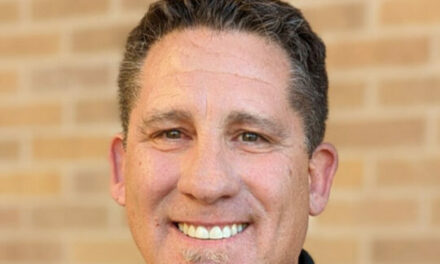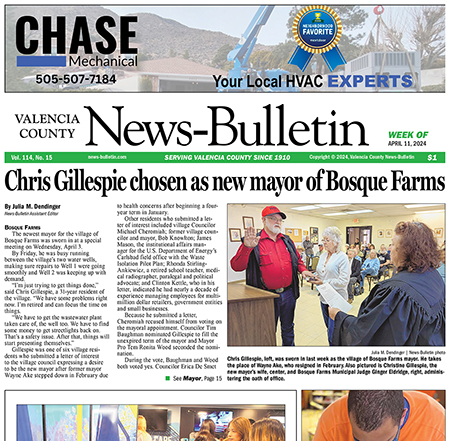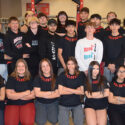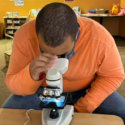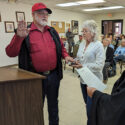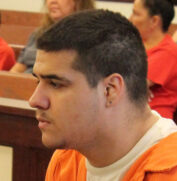
Brandon Villalobos during a 2017 hearing.
News-Bulletin file photo
After a legal battle of briefs and oral arguments, the New Mexico Supreme Court affirmed a district court judge’s decision to suppress some of the statements made by a teenage defendant accused of a 2014 murder.
In May 2018, 13th Judicial District Court Judge James Lawrence Sanchez ruled that statements made by Brandon Villalobos to Valencia County Sheriff’s Office detectives after Miranda warnings were given and Villalobos was handcuffed would be suppressed.
Villalobos, now 20, is accused of killing his 12-year-old-friend, Alex Madrid, on Feb. 17, 2014, and has been indicted by a grand jury on one count of first-degree murder and one count of tampering with evidence.
During a status hearing Tuesday morning, Sanchez set Monday, Dec. 16, as the opening day of Villalobos’ trial.
In the same 2018 order, Sanchez ruled that statements made before the Miranda warning were admissible, since Villalobos, who was 15 at the time, was not detained as part of a criminal investigation until after Madrid’s body was found.
“The defendant did not knowingly or intelligently waive his Miranda rights. Defendant was never asked what those rights meant in his own words …” Sanchez wrote last year. “Even if the Miranda warning was intelligently and knowingly made, all admissions made after (Villalobos) was handcuffed without justification were not voluntarily made …”
The Supreme Court issued its affirmance of Sanchez’s ruling on June 24.
The district attorney’s office appealed Sanchez’s ruling, arguing that Villalobos intelligently and knowingly waived his Miranda rights.
During questioning by VCSO detectives Alejandro Lara and David Hill, Villalobos claimed he and Madrid had been approached by unknown men, who assaulted them and killed Madrid.
About 45 minutes into the questioning, detectives pushed Villalobos on details of his recollection, saying what he’d told them wasn’t making sense.
“After about four additional minutes of more pointed questioning, Villalobos began to sob …” the defense appeal reads.
After another few minutes of questioning, Villalobos asked for his parents, the appeal says, and “after about two more minutes of Villalobos sobbing and the detectives sporadically posing questions, Villalobos again asked for his parents.”
Questioning stopped, and Villalobos’ mother, Loretta Villalobos, was called and she went to the VCSO office. Detectives resumed questioning and after about 13 minutes, Loretta Villalobos left the room and Hill followed.
While his mother and the detective were out of the room, Villalobos became more animated and physically demonstrative than he had been, the appeal said, interrupting and talking over Lara.
After being cautioned by Lara about lying in court, Villalobos said he wanted his parents back in the room. Hill returned to the interview room, and handcuffed Villalobos, who began crying and denied any wrongdoing.
Both detectives left the room, but while Lara was standing just outside the door to the room, Villalobos admitted to hitting Madrid.
“Villalobos explained that he had hit (Madrid) with a crowbar, that he had done so only once and because (Madrid) had disparaged (Villalobos’) daughter and attacked him with a screwdriver,” the document reads.
According to Villalobos, Madrid got back up after the blow and was alive when the two boys parted ways that night.
However, he went on to contradict himself, saying that Madrid stayed down after being hit.
“… he had then picked (Madrid) up, carried him, put him under a mattress to keep him warm, and returned home,” the state’s appeal said.
Prior to questioning Villalobos at the sheriff’s office, Lara spoke with him at the family’s home in Meadow Lake after Madrid was reported missing.
When Lara arrived at the home, a VCSO detective and sergeant were already on scene and didn’t indicate that Villalobos was a suspect.
In an attempt to find Madrid, Villalobos went with Lara in his vehicle to direct the detective to the mobile home the two had been at the night before with the intent to vandalize the structure.
When they arrived at the mobile home, which was about two miles from the Villalobos home, Brandon Villalobos told Lara a vehicle with three men had driven up and they threatened the boys.
“At the time, Lara … was concerned only about finding (Madrid), and thought that perhaps (Madrid) was simply at a friend’s house …” the brief said.
While at the abandoned mobile home, Lara found no signs of a disturbance or tire tracks, despite Villalobos’ claims of a scuffle with the men.
Lara and the officers told Villalobos they believed him and urged him to tell them where Madrid was so they could make sure he was safe.
Villalobos took them to another location nearby, where Lara saw a mattress about 20 yards away. Villalobos remained in the truck while the detective investigated the mattress, discovering Madrid’s body.
In July 2017, after more than three hours of expert testimony, Sanchez ruled Villalobos was competent to stand trial for the murder of Madrid.
During his testimony, Dr. Nathan Andrews, who testified for the state and held the opinion that Villalobos was competent, said Villalobos’ history of intellectual disability was well documented, and had an intellectual abilities below 70, along with the associated deficits and deficiencies.
However, Andrews said that did not mean Villalobos was not competent to stand trial.
The year prior, Sanchez found Villalobos was not competent to stand trail and he was remanded to the state Behavioral Health Institute in Las Vegas, N.M., where he underwent treatment in an attempt to become declared competent.
Julia M. Dendinger began working at the VCNB in 2006. She covers Valencia County government, Belen Consolidated Schools and the village of Bosque Farms. She is a member of the Society of Professional Journalists Rio Grande chapter’s board of directors.


